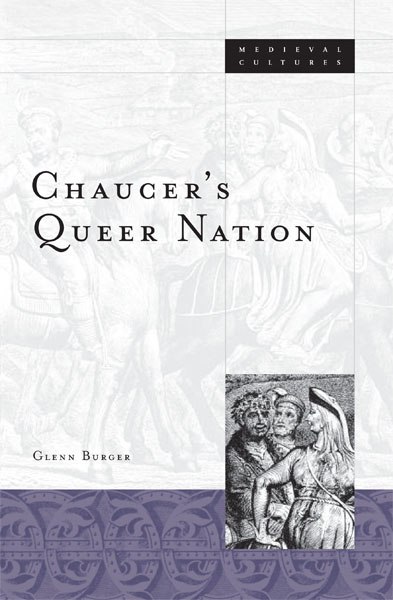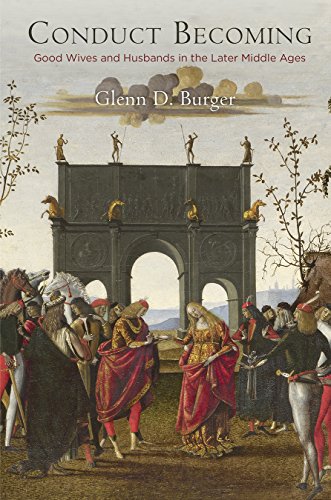Distinguished Professor
Klapper Hall, Room 735
718-997-4661
glenn.burger@qc.cuny.edu
You can find my short CV here.
Research Interests
My dissertation and first book provided a critical edition of a fourteenth-century geography of Asia, history of the Mongols, and of the campaigns of Western Crusaders, Armenians, and Mongols against the Mamluk Sultans of Egypt, written by an Armenian prince, Hetoum of Korikos and titled A Lytell Chronicle: Richard Pynson’s Translation (c. 1520) of “La Fleur des histoires de la terre d’Orient” (1307). That focus on medieval East/West relations later led to a wider interest in contemporary postcolonial theory and medieval ethnic, religious and national identities. More recently, I have become interested in the turn to a Global Middle Ages. I also have longstanding research interests in medieval gender and sexuality, especially as they relate to Chaucer’s Canterbury Tales. Most recently this has led to writing about conduct literature for women, medieval affect and emotion, and the early modern bourgeois and gentry household. My current book project is titled Chaucerian Affect and focuses on the roles of pity and anger as structures of feeling and self-identification in the Canterbury Tales, as well as the role of affect in constructing “Chaucer the Man” in the Tales.
Teaching Interests
My teaching interests include Chaucer, medieval gender and sexuality, medieval marriage, medieval women’s writing, and medieval affect and emotion. At the undergraduate level most recently I’ve taught ENGL 331 Chaucer’s Canterbury Tales; ENGL 391 Senior Seminar: Troilus and Criseyde and the Matter of Troy; and ENGL 395 Inventing With the Body: The Medieval “Heterosexual Marriage” Debate. I’ve also taught a range of courses for our MA program: Chaucer’s Canterbury Tales; Sex, Gender, and Sexuality; Text and Nation in Medieval England; and The Medieval Heterosexual Marriage Debate. I look forward to working with MA students interested in medieval literature, especially as it intersects with issues of gender/sexuality/queer theory/trans theory, feminist theory and women’s writing, affect and emotion studies, and the Global Middle Ages.
Selected Publications
Books
Burger, Glenn. Conduct Becoming: Good Wives and Husbands in the Later Middle Ages. Philadelphia: University of Pennsylvania Press, 2018.
_____. Chaucer’s Queer Nation. Minneapolis: University of Minnesota Press, 2003.
Hetoum. A Lytell Cronycle: Richard Pynson’s Translation (c. 1520) of “La Fleur des histoires de la terre d’Orient” (c. 1307). Ed. Glenn Burger. Toronto Medieval Texts and Translation Series 6. Toronto: University of Toronto Press, 1988. [Critical Introduction, ix-lxii; Hetoum’s Text, 3-88; Editor’s Critical Apparatus (commentary, textual notes, variants, glossary), 89-161.]
Edited Collections
Burger, Glenn and Rory Critten, eds. Household Knowledges in Late Medieval England and France. Manchester: University of Manchester Press, 2019.
Burger, Glenn and Holly Crocker, eds. Medieval Affect, Feeling, and Emotion. Cambridge: University of Cambridge Press, 2019.
Burger, Glenn and Steven F. Kruger, eds. Queering the Middle Ages. Minneapolis: University of Minnesota Press, 2001.
Book Chapters and Journal Articles
Burger, Glenn. “Pite.” New Companion to Critical Thinking on Chaucer. Ed. Stephanie Batkie, Matthew Irvin, and Lynn Shutters. Amsterdam: Amsterdam University Press, 2021. 59-74
______. “Who Could Tell the Joy That Is Between a Husband and His Wife? Feeling with the Good Wife in the Franklin’s Tale.” Special Issue: “The Woman Question: Chaucer in His European Context.” Ed. Betsy McCormick and Wendy Matlock. Chaucer Review, 55.4 (2020): 422-40.
______. “Becoming One Flesh, Inhabiting Two Genders: Ugly Feelings and Blocked Emotion in the Wife of Bath’s Prologue and Tale.” Medieval Affect, Feeling, Emotion. Cambridge: University of Cambridge Press, 2019. 90-117.
______. “Knowledge Production in the Late Medieval Married Household: The Case of Le Menagier de Paris.” Household Knowledges in Late Medieval England and France. Manchester: Manchester University Press, 2019. 16-44.
______. “‘Pite renneth soone in gentil herte’: Ugly Feelings and Gendered Conduct in Chaucer’s Legend of Good Women.” Special Issue: “Looking Forward, Looking Back on the Legend of Good Women.” Ed. Betsy McCormick, Leah Schwebel, and Lynn Shutters. Chaucer Review 52.1 (2017): 66-84.







